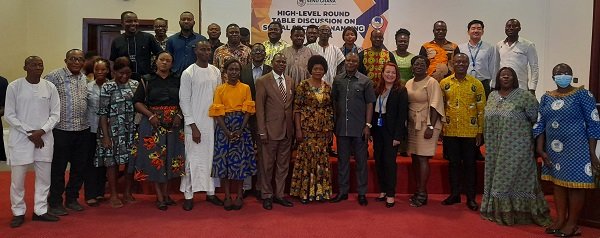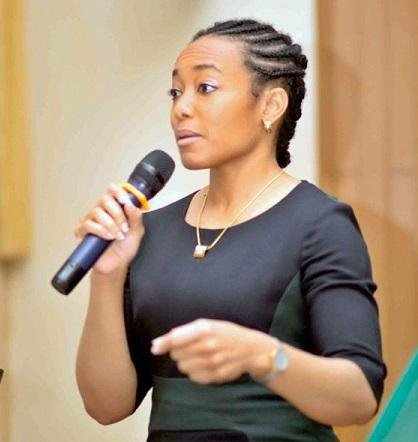Hot!
Stakeholders urge government: don’t cut funding to key sectors of economy

• The stakeholders
In spite of dwindling economic fortunes, the government has been urged not to cut expenditure on key sectors that seek to promote social and economic well-being of citizens.
Stakeholders say areas such as Education, Health, Water, Sanitation and Hygiene (WASH) as well as Child and Social Protection should continue to receive adequate funding, in view of current economic hardship.
This and other recommendations were the highlights of a discussion on ‘Social Protection Financing in Ghana’ organised by SEND Ghana and its partners in Accra last Friday.
A United Nations International Children’s (UNICEF) Report presented at the forum indicated that reduction in expenditure of important sectors of the economy may adversely affect the gains made in reducing poverty and attaining the Sustainable Development Goals (SDGs).
The report which made analysis and provided recommendations across five strategic sectors observed that budget allocation to the education sector had decreased from 15.74 per cent in 2020 to 13.11 per cent in 2022, and that 90 to 95 per cent of the allocations to the Ministry of Education went into payment of compensation of employees.
This scenario which is evident in other government Ministries Departments and Agencies (MDAs), according to UNICEF, would “negatively affect the delivery of social services, especially for women, children and the vulnerable.”
“Investing in children’s health, nutrition, sanitation, education and protection is important to unlock their potential and contribute positively to economic activities. The cost of inaction in these areas is enormous and cannot be overlooked,” it stated.
Stressing the need to secure social intervention policies, the report prompted the government to ensure “regular and timely” release of funds for social programmes such as the Livelihood Empowerment Against Poverty (LEAP) which had consistently experienced delay in payments.
The report established that though allocations for LEAP had seen “significant increases since 2017,” the value of the money paid to beneficiaries had reduced as a result of inflation, hence the need to adjust the payments accordingly.
In the health sector, it called for increase in total health budget as well as “investments that tackle the prevention and control of communicable diseases, neonatal health and adolescent reproductive health.”
While urging increased budget allocation to key sectors, it suggested “progressive revenue-raising policies,” to support social interventions and further proposed introduction of “a shock-responsive emergency fund to ensure that the government can respond quickly to emerging crises.”
Panelists at the forum, including Members of Parliament, Representatives of MDAs, Academia and Civil Society Organisations, maintained that government expenditure in areas such as social protection, education, health, among others, should be seen as an investment rather than waste of resources.
Mr Mawutor Ablo, Director, Ghana Productive Safety Net Project, Ministry of Gender and Social Protection (MOGSP), said equitable resource allocation to fundamental sectors of the economy would have positive impact on the citizenry and contribute to national development.
“Any money spent on the extremely poor and vulnerable is empowering them to become more productive so if we accept social protection as an investment we have to create the fiscal space for that to happen,” he noted.
Mr. Nii Lantey Vanderpuje, Member of Parliament for Odododiodo Constituency, also emphasised the need to increase funding for social protection and basic social services to help ease the economic burden on citizens.
Dr. Emmanuel Ayifah, Deputy Country Director, SEND Ghana, said the organisation would continue to engage the government and stakeholders on the issues raised which would be factored into the 2023 Budget and Economic Policy Statement of the government.
By Ernest Nutsugah
Hot!
Ghana to locally refine its gold starting October 2025 – Sammy Gyamfi

The Chief Executive Officer of the Ghana Gold Board, Sammy Gyamfi, has announced that plans are far advanced for the establishment of a state-owned gold refinery in the country.
Speaking at the 2025 Minerals and Mining Convention, Mr Gyamfi said the refinery will process locally mined gold into bullion instead of exporting it in its raw state.
According to him, it is unacceptable that Ghana, despite being a leading gold producer in Africa, continues to export raw gold known as dore.
He explained that the Gold Board, working with the Bank of Ghana and local refineries, will from October 2025 begin refining gold locally.
He also disclosed that an ultramodern assay laboratory will be built to ensure international standards in testing gold quality.
Mr Gyamfi noted that the refinery will be wholly state-owned and will help Ghana move away from raw mineral exports to value addition.
This, he said, will boost foreign exchange earnings, create jobs, and position Ghana as a hub for gold refining and jewellery production in Africa.
The CEO stressed that the project forms part of government’s strategy to ensure the country benefits fully from its natural resources and to transform the mining sector into a driver of economic growth.
By: Jacob Aggrey
Hot!
There is strength in diversity; let’s live in peace – Zanetor Rawlings urges Ghanaians

Member of Parliament for Korle Klottey, Dr. Zanetor Agyeman-Rawlings, has urged Ghanaians, especially the youth, to value the peace the country enjoys and to see diversity as a source of strength.
Speaking at the National Youth Conference held at the Pentecost Convention Centre under the theme “Igniting Potential; Inspiring Change”, she warned against being lured into conflicts and divisions fueled by reckless statements from politicians, traditional leaders, religious figures, or academics.
According to her, many young people have no idea what it means to live in a country torn apart by war, and therefore must not take Ghana’s peace for granted.
She stressed that the harmony among different ethnic and regional groups should be protected at all costs, since it is peace that allows citizens to gather freely and safely.
Dr. Zanetor said Ghana’s development depends on embracing diversity and working together.
She urged the youth to tap into this strength so that Ghana would continue to shine as the “Black Star” of Africa and serve as an example for other nations.
She expressed appreciation to the participants for attending the conference and asked for God’s blessings on the country.
By: Jacob Aggrey






